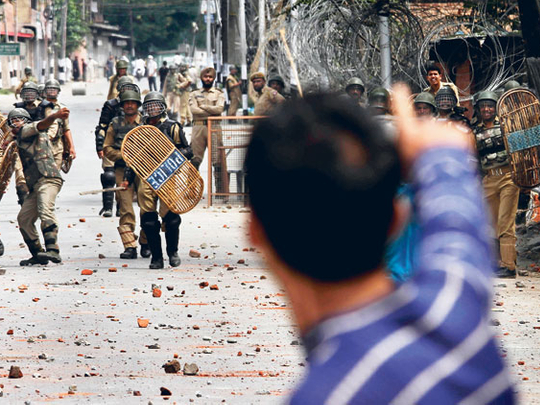
Once known for its extraordinary beauty, the valley of Kashmir now hosts the biggest, bloodiest and also the most obscure military occupation in the world. With more than 80,000 people dead in an anti-India insurgency backed by Pakistan, the killing fields of Kashmir dwarf those of Palestine and Tibet.
In addition to the everyday regime of arbitrary arrests, curfews, raids and checkpoints enforced by nearly 700,000 Indian soldiers, the valley's four million Muslims are exposed to extra-judicial execution, rape and torture, with such barbaric variations as live electric wires inserted into genitalia.
Why then does the immense human suffering of Kashmir occupy such an imperceptible place in our moral imagination? India has contained the insurgency provoked in 1989 by its rigged elections and massacres of protesters.
The hundreds of thousands of demonstrators that fill the streets of Kashmir's cities today are overwhelmingly young, many in their teens, and armed with nothing more lethal than stones.
Yet the Indian state seems determined to strangle their voices as it did of the old one. Already this summer, soldiers have shot dead more than 56 protesters, most of them teenagers.
The New York Times this week described the protests as a comprehensive "intifada-like popular revolt". They indeed have a broader mass base than the Green Movement does in Iran. But no colour-coded revolution is heralded in Kashmir by western commentators.
The BBC and CNN don't endlessly loop clips of little children being shot in the head by Indian soldiers. Bloggers and tweeters in the West fail to keep a virtual vigil by the side of the dead and the wounded.
Kashmiri Muslims are understandably bitter. As Parvaiz Bukhari, a journalist, said early this week the stones flung randomly by protesters have become "the voice of a neglected people" convinced that the world deliberately ignores their plight. The veteran Kashmiri journalist Masoud Hussain confessed to the near-total futility of his painstaking auditing of atrocity over two decades.
The cautiousness — or timidity — of western politicians is easy to understand. Apart from appearing as a lifeline to flailing western economies, India is a counterweight, at least in the fantasies of western strategists, to China.
A month before his election, Barack Obama declared that resolving the "Kashmir crisis" was among his "critical tasks". Since then, the US president hasn't uttered a word about this crisis that has seeded all major conflicts in south Asia. David Cameron was advised a similar strategic public silence on his visit to India last fortnight.
Those western pundits who are always ready to assault illiberal regimes worldwide on behalf of democracy ought not to be so tongue-tied. Here is a well-educated Muslim population, heterodox and pluralist by tradition and temperament, and desperate for genuine democracy.
However, intellectuals preoccupied by transcendent, nearly mystical, battles between civilisation and barbarism tend to assume that "democratic" India, a natural ally of the "liberal" West, must be doing the right thing in Kashmir, i.e. fighting "Islamofascism".
Thus Christopher Hitchens could call upon the Bush administration to establish a military alliance with "the other great multi-ethnic democracy under attack from Muslim fascism" even as an elected Hindu nationalist government stood accused of organising a pogrom that killed more than 2,000 Muslims in the Indian state of Gujarat in 2002.
Evasive intellectuals
Indian writers and intellectuals, who witnessed the corrosion of India's secular democracy by Hindu supremacists, seem better acquainted with the messy realities concealed by stirring abstractions.
But on Kashmir they often appear as evasive as their Chinese peers are on Tibet. They may have justifiably recoiled from the extremist and brutish aspect of the revolt in the valley. But the massive non-violent protests in Kashmir since 2008 haven't released a flood of pent-up sympathy from them.
Certainly, as Arundhati Roy's recent writings prove, anyone initiating a frank discussion on Kashmir risks a storm of vituperation from the Indian understudies of Bill O'Reilly and Sean Hannity. The choleric TV anchors, partisan journalists and opinion-mongers of India's corporate media routinely amplify the falsehoods and deceptions of Indian intelligence agencies in Kashmir.
Blaming Pakistan or religious extremists, as the Economist pointed out last week, has "got much harder" for the Indian government, which, has "long denied the great extent to which Kashmiris want rid of India".
Nevertheless, it tries; and, as the political philosopher Pratap Bhanu Mehta, one of the few fair-minded commentators on this subject, points out, the Indian media now act in concert with the government "to deny any legitimacy to protests in Kashmir".
"The promise," Mehta writes, "of a liberal India is slowly dying". Liberated from political deceptions, the young men on the streets of Kashmir today seem simply to want to express their hatred of the state's impersonal brutality, and to commemorate lives freshly ruined by it.
Pankaj Mishra is an Indian author and writer of literary and political essays.









